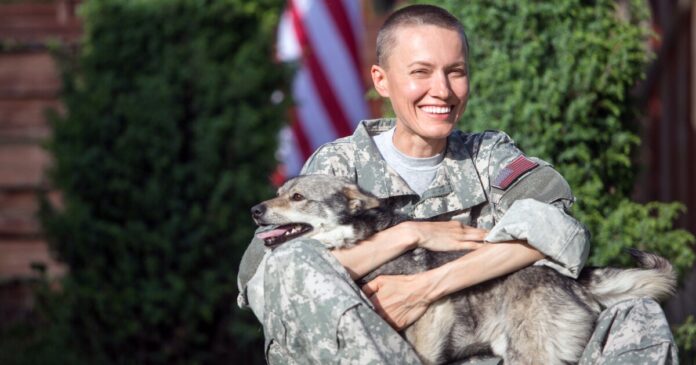Training a service dog doesn’t just change the life of another veteran; it may help heal the trainer, too. A new study finds that volunteering with dogs could slow biological aging in female veterans with PTSD while easing stress and anxiety.
Finding effective ways to tackle post-traumatic stress disorder (PTSD) in veterans, especially those who’ve seen combat, is a worthy cause that has occupied the minds of many researchers over the years. It’s an unfortunate reality that women veterans, however, tend to be underrepresented in this kind of research.
In a new study led by Florida Atlantic University (FAU), in collaboration with the University of Maryland School of Nursing, the Medical College of Georgia, and Warrior Canine Connection, researchers have looked at whether helping to train service dogs could improve the mental and biological markers of stress in female veterans with PTSD.
“Female veterans face unique reintegration challenges that are often overlooked, and traditional PTSD treatments don’t always meet their needs,” said the study’s lead author, Cheryl Krause-Parello, PhD, a research professor in FAU’s College of Nursing. “Nontraditional approaches like connecting with animals can offer meaningful support. These relationships provide emotional safety and stability, which can be especially powerful for women. But not all veterans can care for a service animal, so animal-related volunteerism may offer similar healing benefits without the burden of ownership.”
The researchers recruited 28 female veterans aged 32 to 72, all of whom had been diagnosed with PTSD. They were randomly assigned to one of two groups. In the Service Dog Training Program (SDTP) group, 13 women trained dogs for other veterans under the Warrior Canine Connection program. They attended one-hour weekly sessions for eight weeks with a certified trainer. The other group was a control group, in which 15 women watched dog-training videos but received no real-life dog interaction.
Participant assessments were done before, mid-, and after the eight-week program and included measuring biological and psychological markers. Biological markers included telomere length, which is a marker of cellular aging (longer telomeres indicate slower aging), and heart rate variability (HRV), a marker of stress resilience (a higher HRV is better). The psychological markers measured included PTSD symptom severity, perceived stress, and anxiety. The researchers also checked whether combat exposure affected the outcomes.
Telomere length increased slightly in the dog-training group, while it decreased in the control group, suggesting slower cellular aging among women who trained service dogs. This difference was strongest in women who had combat exposure. Somewhat unexpectedly, HRV actually decreased – meaning that stress increased – in the dog-training group, possibly because in-person, outdoor sessions during COVID protocols introduced new stressors. No change in HRV was seen in the control group.
Across both groups, participants showed lower PTSD symptom severity, lower perceived stress, and lower anxiety. However, these improvements did not differ between the groups. So, the dog training itself didn’t produce greater mental health gains than just watching training videos. The researchers think that just taking part in the study and receiving attention may have provided support to the women.
The researchers acknowledge the study’s limitations, including that the sample size was small; results are “suggestive” rather than conclusive. It was also of short duration. Eight weeks is too brief to fully capture biological changes such as telomere growth. Physical movement during dog training vs sitting to watch videos made comparisons of HRV between the groups tricky. Participants’ stress was likely increased when research was paused and resumed with outdoor sessions due to COVID-19. Finally, many women reported military sexual trauma, which could influence how they respond to animal-assisted therapy.
“This study underscores the power of service dog training as a meaningful, non-pharmacological intervention to support the health and healing of female veterans with PTSD,” Krause-Parello said. “It opens the door to more personalized approaches that nurture both the mind and body.”
Future, larger studies could explore the long-term effects, include different types of trauma, and use more precise biological measures such as telomere activity. However, for now, this study supports the idea that purposeful, animal-assisted volunteer work can play a valuable role in the recovery and reintegration of female veterans.
The study was published in the journal Behavioral Sciences.
Source: Warrior Canine Connection


